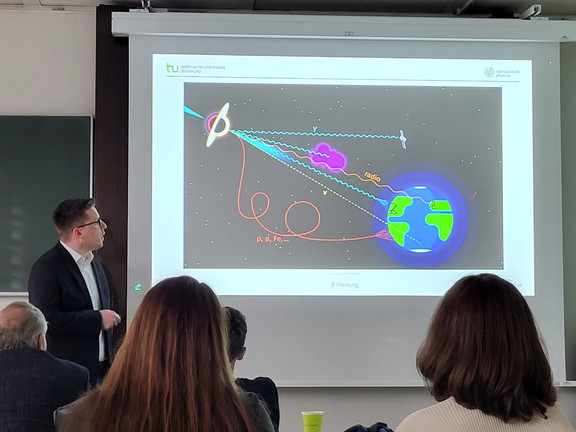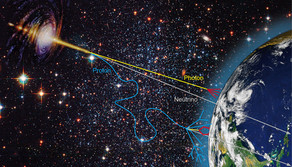Congratulations to Dr. Felix Geyer on the successful completion of his PhD
- News
- Allgemein

We would like to congratulate Dr. Felix Geyer on the successful completion of his PhD. His dissertation entitled "One for All: A Comprehensive Analysis Pipeline for Simulating and Reconstructing Radio Observations Including Uncertainty Estimations" is an important contribution to the field of radio astronomy.
Radio astronomy is a branch of astronomy that studies the universe using radio waves. These waves are a type of electromagnetic radiation with wavelengths much longer than visible light, typically ranging from a few millimeters to several meters. Using radio telescopes, astronomers can detect these waves and extract information about astrophysical processes. The high resolution of radio astronomy is based on a physical principle that relates the size of a telescope to the wavelength of the observed radiation: the larger the aperture of a telescope and the shorter the wavelength of the observed light, the finer the details it can resolve. However, building extremely large telescopes presents practical challenges, such as structural limitations and high cost.
To overcome these limitations, radio astronomers use a technique called interferometry. This involves linking several radio telescopes together to work as if they were a single giant telescope. The distance between the telescopes effectively acts as the telescope's aperture. By placing the telescopes far apart, interferometry allows for extremely high resolution. This ability to achieve high resolution makes radio astronomy a crucial tool for studying the universe.
In his dissertation, Felix addresses one of the major challenges in modern radio astronomy: handling the huge data rates generated by current and future radio interferometers by utilizing neural networks. He developed a comprehensive analysis pipeline that includes simulations of radio galaxies and the measurement process of radio interferometers. By incorporating uncertainty estimation into the reconstruction process, his research ensures that the results are scientifically robust. In this way, his work makes an important contribution to the future study of astrophysical phenomena using radio astronomy.

![[Translate to English:] [Translate to English:]](/storages/app-physik/_processed_/3/a/csm_APPGroupphoto2023_001_small_858e4405eb.jpg)


